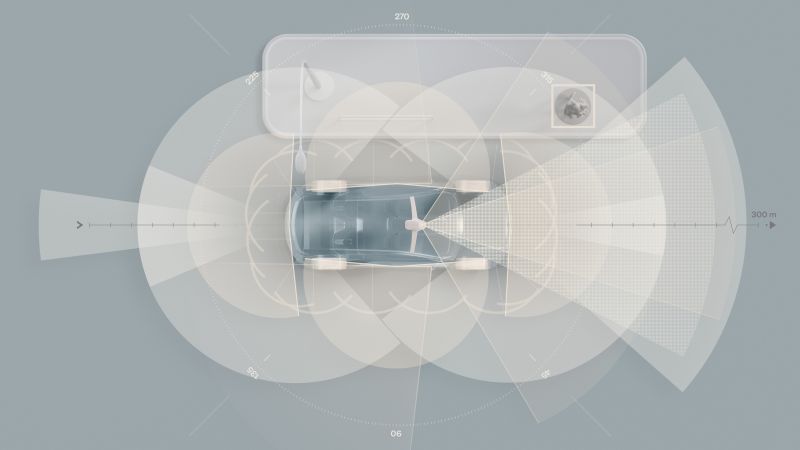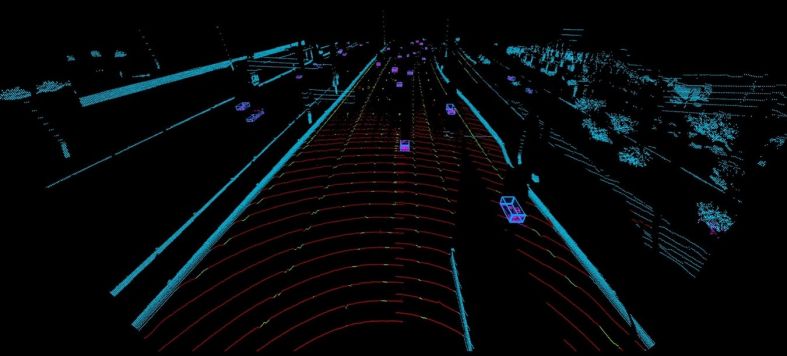Volvo's New Electric XC90 to Come with LiDAR & NVIDIA's Orin Processor for Autonomous Driving
【Summary】Volvo Cars announced that its upcoming fully electric flagship XC90 SUV will come with state-of-the-art sensors for autonomous driving, including a lidar sensor developed by its partner Luminar. The electric XC90 will also use the NVIDIA DRIVE Orin system-on-a-chip to power its autonomous driving and safety systems.

Swedish brand Volvo Cars has always focused on safety. For example, Volvo was the inventor of the 3-point seat belt system in 1959 that's found in all vehicles today. Over the years, Volvo has developed many other other innovative vehicle safety features, such as rearward facing child seats, side-impact airbags and automatic emergency braking (AEB) to prevent collisions.
But as new technologies such as autonomous driving capabilities are being offered by many of the world's automakers, including Volvo, the automaker will once again be a pioneer in vehicle safety. Volvo Cars announced that its upcoming fully electric flagship XC90 SUV will come with state-of-the-art sensors, including lidar technology developed by its partner Luminar.
Volvo's upcoming XC90 will be equipped with Luminar's Iris high-performance lidar technology. The Iris lidar sensor delivers a higher level of vision & perception capabilities compared with camera and radar based systems. It has a range of up to 250 meters for detecting objects.
Volvo announced in May of last year that Luminar would supply lidar perception technology for the automaker's next-generation self-driving vehicles, which includes the new XC90 flagship SUV.
The term lidar is an acronym for "light detection and ranging." Lidar sensors emit millions of pulses of laser light which are reflected off objects in the vehicle's surroundings. The lidar creates a 3D view of the environment, including other vehicles and pedestrians. Lidar acts as the "eyes" of a self-driving vehicle for safe navigation, even at night.

By sending a pulses of laser light, Luminar's Iris lidar sensing system creates a 3D view of the environment for safe navigation.
The upcoming electric XC90, which will be revealed in 2022, will also come with state-of-the-art software from Volvo, Zenseact and Luminar for the next generation of its collision avoidance technology to reduce fatalities and accidents.
The electric XC90 will use the powerful NVIDIA DRIVE Orin system-on-a-chip (SoC) to power the autonomous driving and safety systems. Nvidia's Orin processor is one of the world's most powerful SoCs and delivers the computing power required for computer vision and lidar sensor data processing.
"Volvo Cars is and always has been a leader in safety. It will now define the next level of car safety," said Volvo Chief Executive Håkan Samuelsson. "By having this hardware as standard, we can continuously improve safety features over the air and introduce advanced autonomous drive systems, reinforcing our leadership in safety."
Volvo's new safety package supports over-the-air software updates, so can be made better over time. Volvo says the new technologies are also designed to specifically address those traffic situations which result in severe injuries and fatalities.
Volvo says its next-generation safety technology will allow the vehicle to assist and improve the capabilities of a human driver in safety critical situations. Instead of just warning the driver of hazards, it can intervene automatically in some situations to protect occupants, such as controlling the steering and braking.
"In our ambition to deliver ever safer cars, our long-term aim is to achieve zero collisions and avoid crashes altogether," said Henrik Green, Volvo's chief technology officer. "As we improve our safety technology continuously through updates over the air, we expect collisions to become increasingly rare and hope to save more lives."
In addition to the lidar sensor suite and AI computing performance of Nvidia's Orin SoC, Volvo's electric XC90 will also come with back-up systems for key functions such as steering and braking that make it hardware ready for autonomous driving once its made available.
These back-up systems will enable automated highway driving. Volvo's automated driving system is called "Highway Pilot" and will be offered as an option on the electric XC90. It was developed in-house together with software development company Zenseact.
Highway Pilot will be activated for customers when verified safe and legally allowed for individual geographic locations and conditions, according to Volvo.
The safety technology and the use of lidar can also result in lower insurance costs for Volvo vehicles. The automaker anticipates that accidents involving its vehicles will become increasingly rare in the future.
Volvo Cars will reveal more details on its future technology roadmap at the Volvo Cars Tech Moment event, which will be held on June 30.
-


Ford is Testing a New Robotic Charging Station to Assist Drivers of EVs With Disabilities
-


Ford Raises the Prices of the F-150 Lightning Electric Pickup Due to Rising Raw Material Costs
-


The BMW 7-Series to Feature HD Live Maps From HERE Technologies for Hands-Free Highway Driving in North America at Speeds up to 80 MPH
-


AutoX to Use the 'Eyeonic Vision Sensor' from California-based SiLC Technologies for its Robotaxi Fleet in China
-


LG Develops ‘Invisible’ Speaker Sound Technology That Could Revolutionize In-Vehicle Audio
-


Researchers at South Korea’s Chung-Ang University Develop a ‘Meta-Reinforcement’ Machine Learning Algorithm for Traffic Lights to Improve Vehicle Throughput
-


Zeekr’s New 009 Electric Passenger Van is the World’s First EV to Feature CATL’s Advanced ‘Qilin’ Battery With a Range of 510 Miles
-


Redwood Materials is Building an Electric Vehicle Battery Recycling Facility in South Carolina
- Consumer Reports Survey Finds Roughly 28% of Respondents Don't Want to Buy an EV
- Rivian Discontinues Base Model for R1S, R1T
- Honda's New EV Friendly Retail Plans Hint at the End of Mega Dealerships
- Ford is Investing $3.7 Billion and Adding Over 6,200 UAW Manufacturing Jobs in the Midwest to Produce New Vehicles
- GM to Invest $81 Million to Hand-Build Cadillac Celestiq in Michigan
- Ford CFO Claims Inflation Has Erased Mustang Mach-E Profits
- The BMW 7-Series to Feature HD Live Maps From HERE Technologies for Hands-Free Highway Driving in North America at Speeds up to 80 MPH
- California’s Electric Vehicle Sales for Q1-Q3 2022 Show That Tesla is Facing Growing Competition
- Tesla is Bringing in Engineers From Shanghai to Help Ramp Up Production Capacity at its California Factory
- Panasonic Announces Multi-Year Agreement to Supply Electric Vehicle Batteries to Lucid Group











 About Us
About Us Contact Us
Contact Us Careers
Careers